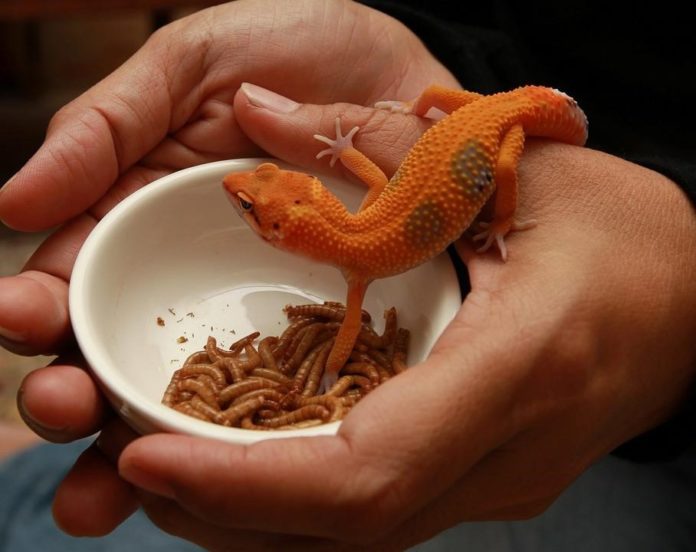Worried about feeding your pet reptile? Read this article to know how to use feeder insects for your reptile.
Are you planning to get a pet reptile? Do you already have one? Like all pets, one of the most important things to keep in mind is their diet and nutrition. What you feed your pet can directly affect their health and well-being. So what should you feed your pet reptile? Insects are undoubtedly their favorite!
If you are new to this, you might be wondering how to choose the right kind of insect for your pet. Insects are not just nutritious but also the tastiest food on your reptile’s menu! In this article, you’ll learn about which insects can be the most beneficial depending on the type of reptile and where you can easily find them. There is a wide range of insect species to choose from. From wax worms to roaches, some insects might be great for your pet while others would not provide enough nutrition.
Gut Loading and Dusting Insects
Before you choose an insect for your pet, always remember to gut load. Sometimes insects are fed nutritional food so that when they are consumed by the reptile, they get all the nutrition too. This is called gut loading.
You should also dust your feeder insects with vitamins and calcium powder. Most insects have a high value of phosphorus but less calcium. This may result in a calcium deficiency in your reptile. Dusting with calcium will ensure that your pet receives the full nutritional value from their food.
The Menu
Reptiles can be one of the least expensive and low-maintenance pets that you can get. Feeding them isn’t too difficult either. After you are done with filling up the feeder insects with the desired nutritions you intend to supply your reptile with by dusting and gut loading, let’s see which insect will make the most scrumptious dinner for your pet.
Dubia Roaches
They are the most popular reptile food. They are plentiful in nature and you can easily pick some from your backyard! They are active but don’t jump around, so there is less chance of losing them. They don’t stink, unlike most insects. They are also quite mobile so they catch your pet’s attention quicker. These roaches are also rich in fat, calcium, and protein. Dubia roaches are the most suitable option for geckos and bearded dragons.
Superworms
These are also known as Mario worms. Since they are large in size (1-2 inches), they are good for larger reptiles who can easily crush them, such as chameleons and bearded dragons. If fed to smaller reptiles like lizards and geckos, the worms won’t get crushed properly and can bite your pet! Superworms are the perfect choice if your pet is underweight since they are rich in fat.
Tip: These insects can also bite you! Always use tongs to handle them.
Hornworms
These worms are very juicy and hydrating. If you want a substitute for crickets, then you may try getting hornworms. They are more expensive but keep in mind that one worm can replace several crickets. Because they have a high nutritional value, you can feed them to your malnutrition or underweight reptile. Hornworms are the most suitable for leopard geckos, bearded dragons, and chameleons.
Mealworms
The best thing about mealworms is that you can store them in the fridge for a long time, unlike other insects. They are easy to contain, don’t smell, and are small in size. You can easily find them in almost every pet store. Being rich in vitamins A and B and fats, yet not having enough calcium content, mealworms are not ideal as a regular part of your reptile’s diet.
Crickets
They are the most readily available feeder insects and you can find them in almost any pet store. Crickets are quite active insects so they encourage your reptile’s hunting behavior. They are rich in protein and are easy to dust. However, they are gross and smelly and eat each other, so storing them can be troublesome. Because they move around a lot, containing them can be a hassle too.
Black Soldier Fly Larvae
Also known as Phoenix worms or Calci worms, these insects are another great option for your reptile. They are rich in calcium and protein. These insects also contain lauric acid which is essential for your reptile to be able to fight invading viruses, bacteria, and fungus. After Dubia roaches, Black Soldier Fly larvae are probably the most nutritious food you can give to your pet. However, being small in size (½ to ¾ inches), they are less suitable for larger reptiles since more of them would be necessary.
Wax Worms
Having high calcium content, wax worms are a great addition to your pet’s diet. However, they are also relatively rich in fat, which might lead to obesity if not fed in moderation. But if your reptile is underweight, consider including wax worms in your pet’s diet.
Waxworms are small in size (up to ¾ inches) and so are more suitable for smaller reptiles. These insects are soft and chewy, and reptiles love to snack on them.
Canned Insects
Canned insects are also a great meal for reptiles and are easily available at pet shops. They may not look or smell the best but can be a tasty and nutritious meal for your pet. Crickets are the most common canned insects available but you can choose from a wide range of flavors, such as caterpillars, super worms, mealworms, and snails. Crickets and mealworms are available in two different sizes, so you can easily choose to meet the requirements of both of your small and large reptile pets.
Remember, keeping your animal healthy is the first priority. Along with food habits, it is important that you know where your local vet clinic is.
Feeding only one type of insect to your pet reptile is not a good idea. Just as you don’t eat only one kind of food, not creating a variety in the animal’s diet will deprive it of proper nutrition. Include different insects in their menu and replace each type from time to time. This will not only ensure variety but also keep your reptile healthy.
(Link of the picture- Reptile feeding on Pixabay)

















